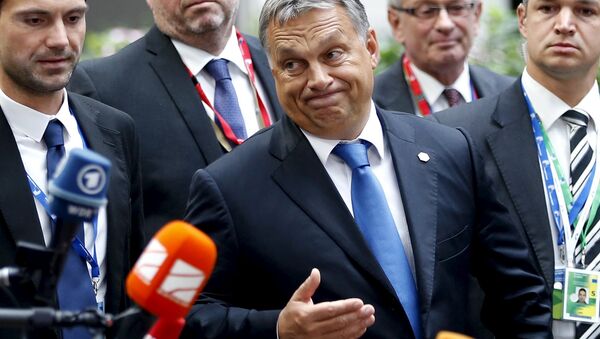In an address to the conservative members of the European People's Party congress in Madrid, Orban said:
"Does it comply with the freedom of information and speech that media usually show women and children while 70 percent of the migrants are young men and they look like an army?"
"This is an uncontrolled and unregulated process."
"Right to human dignity and security are basic rights. But neither the German nor the Hungarian way of life is a basic right of all the people on the earth."
The Eastern European country's attitude towards the refugee crisis is well known, and well-documented. Footage has continuously emerged online and in print, showing police dressed in riot gear firing tear gas at refugees or throwing food to them in a pen.
— Milena Buyum (@MilenaBuyum) October 23, 2015
Victor Orban seems to be the only European leader taking a sensible and realistic approach to migration and refugees.
— Tamara Chabe (@tamarachabe) October 22, 2015
The most obvious sign of Hungary's determination to keep migrants out is the razor wire fence, blocking its borders with Serbia and Croatia. Hungarian laws have also been changed so that if any person succeeds in crossing the metal fence — they are instantly arrested for illegally entering the country.
And the message that refugees are not welcome has also been sent further afield to camps in Lebanon, where the Hungarian government paid for advertising in local newspapers and posters on billboards, telling refugees that they were not welcome.
Victor #orban right now:) "Are you having problems with migrants… really?" pic.twitter.com/QNPm5pVQRw
— Hi Tech (@HiTech3_) October 21, 2015
Orban's actions have received wide condemnation, mainly from other EU leaders. During the meeting of conservative parties from all acrosss Europe,Orban defended his position. However, other EU leaders have welcomed the draconian measures taken by Hungary — Slovenia hasn't ruled out building a fence on its border with Croatia.
Thousands of Hungarian refugees were welcome in Europe in 1956. Let's not forget. #Hungary pic.twitter.com/5GoeysFB8O
— ALDE Group (@ALDEgroup) October 23, 2015
Criticizing the response from the European Commission to impose mandatory migrant quotas on EU countries and Germany for opening its arms to over a million predicted refugees this year, Orban warned that it wasn't just resettling refugees that was the problem.
"What we have been facing is not a refugee crisis. This is a migratory movement composed of economic migrants, refugees and also foreign fighters."
The infiltration of Islamic State militants on refugee boats has been revealed by WikiLeaks. Classified document showed that EU leaders were aware of the potential risk that terrorist networks were infiltrating smugglers boats from Libya and arriving on EU shores.
Difficult not to agree with many of Victor Orban's argument over migrant crisis https://t.co/w7cyoiKUNC
— Georgi Gotev (@GeorgiGotev) October 23, 2015
Another outspoken critic of the administration in Brussels, Nigel Farage, leader of the UK Independence Party claimed half a million Islamic extremists could cross the Mediterranean and reach Britain as a result EU policies.
"The clear demand for the rapid implementation of a common EU migration and asylum policy, to be confirmed in a vote in the European parliament, would be wholly unacceptable to a United Kingdom that already has levels of immigration that are too high, and as ISIL have previously threatened, could lead to half a million Islamic extremists coming to our countries and posing a direct threat to our civilization," Farage told a meeting in Strasbourg.
While the world's media remains focused on the treatment of refugees by individual countries — the intelligence services are focusing on the potential for refugees to be radicalized by Islamic State militants.
@2tweetaboutit Like Farage, Orban is the other one who tells the truth, one day people will think. "Why didn't we listen to these two"
— Mark Braithwaite (@MarkBraithwait2) October 22, 2015
Meanwhile, Hungary, along with many other Eastern European countries, remains keen on building its own economy, whilst approaching the refugee crisis in isolation — despite calls for solidarity from Western European countries.
Six hundred thousand people have arrived in Europe so far this year — the majority heading West, looking for a new life in Germany or Sweden.


